#my meta
Text
What you need to understand is that Dick is Bruce's son. Alfred is Bruce's father. Alfred is Dick's grandfather. Alfred is also Dick's father and Dick's mother. Dick is also Bruce's brother. This is both related and unrelated to Alfred being Dick's parent figure.
Bruce is Damian's father. Alfred is Damian's grandfather. Alfred is also Damian's father. But Damian is not Bruce's brother. Damian is Dick’s brother. Dick is also Damian's father. It's all quite simple and straightforward really.
#DC#DCU#DC Comics#Dick Grayson#Damian Wayne#Bruce Wayne#Alfred Pennyworth#Nightwing#Robin#Batman#Robin I#Robin V#My meta#And Dick is both Bruce and Damian's best friend
221 notes
·
View notes
Text
Soul-Bound in Wano: The Spooky Simpatico of Luffy and Zoro
Just finished Wano, and wow. I'm surprised there isn't more talk about the crazy parallels between Luffy and Zoro throughout the arc, but especially the raid. It's like Oda was trolling us with how perfectly they mirror each other in places.
Of course, there's the whole shared "wandering samurai" theme in Acts I and II, and then there's the heartwarming scene with them both freaking out over spilled soup. (Side note: I wouldn't be shocked if Zoro's anime-only sake scene was stuff Oda had to cut from the manga – it totally fits Oda's style with Zoro.)
But that's just the tip of the iceberg. We've got a ton of other stuff too:
Zoro uses Conqueror's Haki to injure Kaido because they're all desperate? Boom, Luffy digs deep and starts doing it too.
Zoro gets bandaged up like a mummy? Well, guess who can't move because he fell in the ocean?
Both of them get their own team of doctors? How lucky!
Zoro gets revived with an injection? Here comes Luffy, fueled by some meat!
Zoro declares he'll become a GOD if that's what it takes? 🤔 Makes you wonder what that means for Luffy...
Death himself shows up for Zoro? Not good! Now Luffy's literally in cardiac arrest! Speaking of, Zoro's looking rough. Those sunken eyes, man...
Thank god they're both too stubborn to die. And guess what? They get put right next to each other, while people pray for them to wake up
And wouldn't you know it, they wake up at the EXACT SAME TIME
This can't just be a coincidence, right? It feels like they're on some spooky, soul-bound level where Zoro's fate weirdly determines Luffy's. Which actually slots so, so neatly into Wano and its recurring themes of fate! Hell, Oda himself even said in an SBS (the one about Zoro's family tree) that Zoro's story is that of a strange, twisted fate he's completely clueless about.
Honestly, I love that for them.
Zoro might not get a whole arc dedicated to his backstory like Nami, Robin, or Sanji. But the choices he makes carry a surprising amount of weight in the grand scheme of things.
#We talk a lot about how Zoro will follow Luffy to hell#but there's something poetic about Luffy's fate naturally being tied to Zoro's; the same way the tides change based on the moon#I honestly think if Zoro had died in Wano...Luffy wouldn't have woken up either#and vice versa.#They're like cosmically-linked dominos that stand or fall based on each other.#That's also why the idea of Luffy dying young while Zoro lives a long life without him feels wrong to me.#They're both so determined to make sure they share the same fate. And fate seems to share their enthusiasm 🥰#monkey d. luffy#roronoa zoro#wano#one piece#zolu#text post#my meta
72 notes
·
View notes
Text

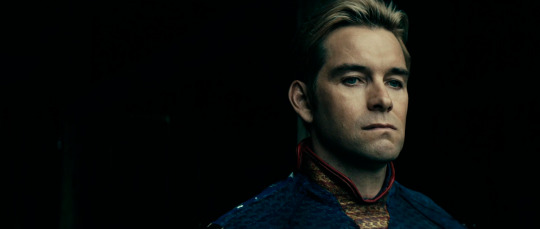

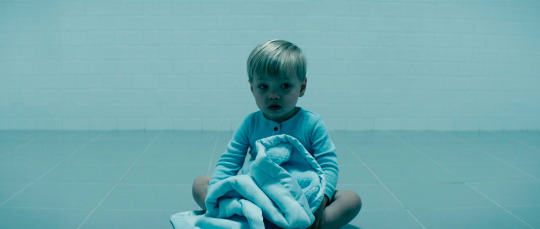

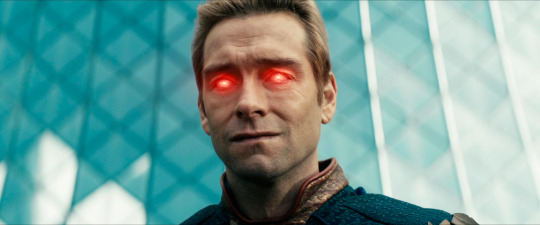

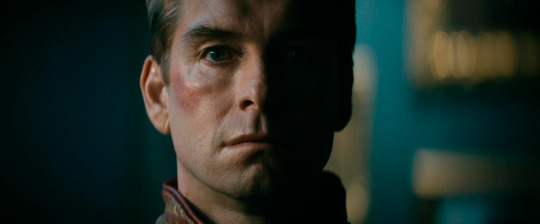
Why do you keep running headfirst into the same brick wall? It's because deep down, there's a part of you that is still... human. We gotta cut that part of you out.
#homelander#mirrorlander#the boys#the boys amazon#the boys tv#words#parallels#lake mungo#antony starr#my edit#it is on its way john#homelander meta#so to speak#my meta#webweaving#villains
76 notes
·
View notes
Text
The Murderbot Diaries and Terminator: Dark Fate: What Does a Killer Robot WANT, Anyway?
The Terminator (1984) is probably the most famous killer robot in media, setting the image for a what a killer robot is. It’s shaped like a bodybuilder, weapons built into its metal skeleton, eyes hidden behind cool and impersonal sunglasses, a threateningly “foreign” accent, and no feelings, no remorse, and no desires besides killing its target. Kyle Reese describes it to Sarah Connor bluntly: “That Terminator is out there! It can't be bargained with. It can't be reasoned with. It doesn't feel pity, or remorse, or fear. And it absolutely will not stop... ever, until you are dead!” And the film supports this wholeheartedly. We get a few scenes from the Terminator’s perspective, and they do not really indicate that it has much in the way of personality or free will. It’s scary because it is a ruthlessly efficient, tireless, and analytical machine built to kill. It will not stop until its target is dead, or it is.
Terminator 2: Judgement Day (1991) gives us a nice Terminator, a Terminator captured from its controlling Skynet and re-programmed to help Sarah and John Connor rather than hunt them. This Terminator gives slightly more suggestions that it has a personality of its own, but ultimately it is still now ruthlessly efficient, tireless, and analytical in protecting its charges, but it still dies at the end in the course of fulfilling its objective. It was, after all, programmed by the human rebels to protect John Connor, and it did.
Did the Terminator want any of that? The second film halfheartedly cares a little, and the first film certainly did not at all. It’s an irrelevant question. It’s a robot; it’s incapable of truly wanting anything, it just does as it’s programmed. It fulfills its objective.
In modern sci-fi, that’s not really a satisfying answer anymore. It looks like a human, has human organic parts built into it, and it clearly has the ability to process large amounts of information and make complex and reasoned decisions. Why do we write it off so thoroughly? Does a Terminator like what it does? Would it choose this? What does a Terminator want?
The Murderbot Diaries (2017-present) by Martha Wells isn’t a direct answer to this question, but it sure is considering it.
The titular Murderbot is very similar to the Terminator: a human-form cyborg, a robot with human organic parts built in, a machine with guns in its arms made to do a job and that job being to protect and/or oppress humans. But as a thinking, feeling, complex entity, it has opinions about that job.
You know what else is a clear response to early Terminator movies’ fundamental uninterest in the Terminator’s inner life and personal opinions on things? Later Terminator movies. Specifically Terminator: Dark Fate (2019).
The fact that The Murderbot Diaries and Dark Fate came out at roughly the same time, in the same sci-fi AI-story zeitgeist, looking back critically at the 80’s and early 90’s Terminator and asking, well, what would it do if it didn’t have to murder, who would it be if it had the choice, is telling.
The Murderbot Diaries stars Murderbot, a SecurityUnit owned by a callously greedy and corner-cutting company that uses such SecUnits ostensibly to protect but in reality to intimidate, control, and surveil human clients. It calls itself “Murderbot” and all SecUnits as a whole “murderbots” for a reason. The world of the books sees SecUnits as mindless killer robots kept in check by their programming, in a very similar way that the Terminator was presented in 1984. We see the story from Murderbot’s point of view: it’s snarky, depressed, anxious, bitter, funny, and very opinionated. It also really, really hates intimidating, controlling, and surveilling people, and it specifically broke its own programming meant to keep it compliant so it wouldn’t have to hurt people. Instead, it wants to half-ass its job and watch soap operas… but it’s sympathetic to humans in danger despite itself, and when it chooses humans it cares about, it will go to great lengths (ruthless, but very tired and full of fear and pity) to protect them. What does it want? To be given space; to not be given orders; to have the ability to take its time and watch its shows and determine what its job as Security means to it.
Terminator: Dark Fate takes a different tack. (It’s actually about three badass women and I’m very sorry for focusing on the man-like character here BUT) Dark Fate presents an alternate timeline off the main series, where the Terminator succeeded in killing young John Connor. Previously, we had seen Terminators that would not stop until they were dead; this one fulfills Reese’s other warning. It will not stop until John Connor is dead. Well…. it succeeded. John Connor is dead.
Now what?
In the opening scene, we see this from his mother Sarah Connor’s perspective. The Terminator appears out of time, ambushes and kills young John Connor, and then stands there looking impassively at the destruction it wrought while Sarah screams.
It looks cold and satisfied when that scene is first presented. But when we see it again from the Terminator’s perspective, it seems to just stand there, staring stupidly, suddenly with no direction in life. It fulfilled its objective. It followed its programming. Now it has no more objective, can receive no more orders, and its programming has nothing more to tell it to do. It eventually disappears into the woods, learns more about humanity, grows a conscience, lives in a little cabin with a woman and her son fleeing an abusive husband in an apparently mutually very supportive relationship, chops wood, drives a truck, and gives Sarah Connor insider information to allow her to track down other incoming Terminators as a way of atonement. It does have remorse, if given time to think for itself and realize it. It doesn’t really want to hurt people, and even, similar to Murderbot, has a drive to use its strength and intimidating-ness to protect the people it chooses. It mostly wants to be quietly and safely left alone.
Both the Terminator and Murderbot are killer robots left adrift, aimless, reeling, suddenly having to decide for themselves what to do with their lives for the first time. Both are stories that circle back to the original Terminator premise and say, okay, but that killer robot isn’t killing for the sheer thrill of it, it was forced into doing that by a top-down authority in control of its programming. That would kind of fuck someone up, actually. It’s a hopeful narrative: these things are people, and they don’t want to be hurting other people. When given the option, they just want to rest, make amends, understand the truth, find a place they belong, and see the people they care about safe. And I think it’s fascinating that not only is smaller, literary sci-fi asking this question and telling this story, but so is the Terminator franchise itself.
We also just as blatantly see the evolution of Sarah Connor as a character. In The Terminator (1984) the Terminator is sent to kill Sarah Connor. When I was watching it recently with some friends who had never seen it before, they guessed—almost correctly—“oh, it’s because she’s the rebel leader in the future!” Sorry guys, this is a 1980s mainstream sci-fi blockbuster. Her as-yet unborn son is going to be the rebel leader. That’s why the robots in the future need to kill her, before she gives birth to the hero of the humans. Blech, I know.
Over the course of the movie, though, she becomes tough, fierce, and brave, the type who can and will survive the apocalypse; in future movies and tv series (like The Sarah Connor Chronicles, 2008, where she gets to be the eponymous title character this time!), she gets to be a strong leader in her own right. This is particularly true in Terminator: Dark Fate, where Sarah Connor is a tough, grizzled, middle-aged Terminator-fighter, who steals heavy weaponry from the government to track down and kill Terminators arriving from the future. She becomes a mentor to the new woman being hunted down by the new Terminator threat, Dani Ramos. This time, though, Dani isn’t fated to be the mother of the human rebel leader—she is destined to become the human rebel leader herself. Along with Dani’s own Kyle Reese figure, a cybernetically-augmented human fighter from the future named Grace, women get central action-hero and rebel-leader roles in Terminator: Dark Fate, feeling like an awkward apology for the sexism inherent in the premise of 1984’s The Terminator. (However, Dark Fate stops short of committing to the Dani-Sarah/Grace-Reese parallel and letting them be lesbians. It’s still a mainstream action movie, I guess.) We even see the development of a curt but resentfully respectful understanding between Sarah Connor and the Terminator that killed her son.
I lay this out because in the same way I see the literary DNA of the Terminator in Murderbot, I see elements of Sarah Connor in Dr. Mensah. She’s the human protagonist—the one who would be the protagonist if All Systems Red had been from the human perspective—and feels like the answer to a similar question to “what does a killer robot want?”, namely, “what if, instead of enemies locked into battle to the death, the badass human and the killer robot worked together and came to an understanding? What if they could be friends instead of enemies?” Mensah also feels like a feminist response to some of the issues I had with Sarah Connor—that she didn’t get to be the leader herself, that despite her own strength and tenacity being the mother to the leader was the most important thing she would do—and responds to them in a similar way that Dark Fate somewhat apologetically does. Mensah is the leader of her society (her planet). Mensah is a mother and she is a scientist and a leader and gets her badass action-hero moments (MINING DRILL). She is the first to reach out to Murderbot. To ask it how it feels, and calm down the others later when they’re afraid; her relationship with Murderbot is unique. She’s a foil to Murderbot in a parallel but opposite way that Sarah Connor is a foil to the Terminator. And while in Dark Fate they are not friends (the Terminator did still kill Sarah’s son, even if it didn’t specifically want to) we see the same kind of desire reflected: what if they were at least allies? What if they were working together? How would that relationship go? What kind of understanding could they come to, about what it means to be human and to be machine? It's a smaller part of the movie and they don't give a whole lot of answers, but it's there.
Both All Systems Red (and the subsequent Murderbot Diaries books) and Terminator: Dark Fate were released in a very different sci-fi zeitgeist than The Terminator was. They’re both looking back, and reacting to it: Dark Fate directly, The Murderbot Diaries indirectly. And they’re approaching the concept of the Terminator and its Sarah Connor figure with similar questions: What does the robot want, aside from its programming to kill, and if it could be freed of its programming to kill, what kind of relationships—with society, with the concept of self-determination, and with its human woman foil—could it potentially be able to develop, with that freedom?
#They’re also both aroace#is it regressive? Does it imply things about sex/romance and humanity?#I don’t care I appreciate that neither one had to prove itself a whole person by falling in love#that’s a topic for a different post#Dani and Grace didn’t get a romance either. Cowards#but I kind of appreciate there was no human romance and sex/inhuman lack of romance and sex that was sorta lowkey going on in the original#This piece is less polished than last week's but oh well#MurderMetaMay#The Terminator#Terminator Dark Fate#The Murderbot Diaries#meta#my meta
71 notes
·
View notes
Text
Angel and Alastor: Masquerade

Angel and Alastor are the first two demons to join the Hazbin Hotel, as respectively a guest and a staff member. However, both hide their real motivations and feelings towards the project.
On the one hand Angel deep down wants to change, but is too scared to admit it:
And I know I'm raisin' cane by every highway in Hell
Maybe things won't be so terrible inside this hotel
On the other hand Alastor has ulterior motives, but he has yet to disclose them:
I'm hungry for freedom like never before
The constraints of my deal surely have a back door
In other words, the two demons wear a mask and refuse to reveal their real feelings. This behavior is rooted in two jungian archetypes that can be used to describe Angel and Alastor's parallel arcs.
PERSONA AND SHADOW
According to Jung, the persona and the shadow are two complementary parts of the human mind:
The persona or mask is what lies in the light for others to see. It is what a person shows while interacting with the world.
The shadow or beast is what is hidden in the darkness. It is what a person represses and refuses to reveal to the world.
Both Angel and Alastor wear personas to hide their shadows:
Angel Dust: Oh ho ho, me? Fake? Wow, I had no idea. Guess that's why I'm an actor, dumbass.
Alastor: Just because you see a smile don't think you know what's going on underneath.
However, they are opposites in how they deal with this masquerade.
Angel embodies the persona, as he is linked to masks and lights (he peforms under flashing lights):
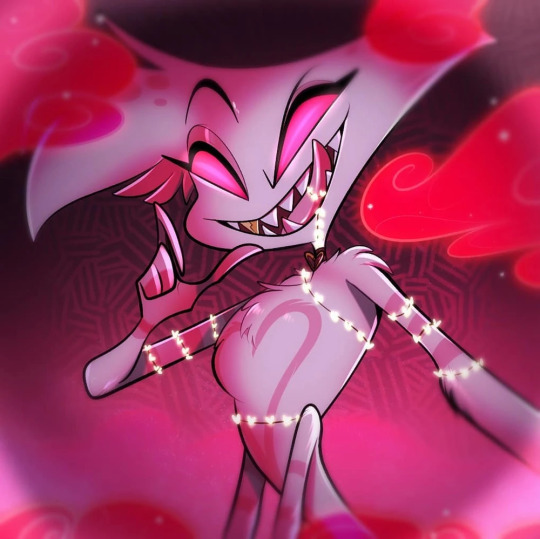
He always acts to the point he is trapped in a neverending role:
Angel Dust: It's not an act! It's who I need to be.
So, he doesn't know who he is anymore. Is Angel Dust all there is? Or can Anthony still be found deep down?
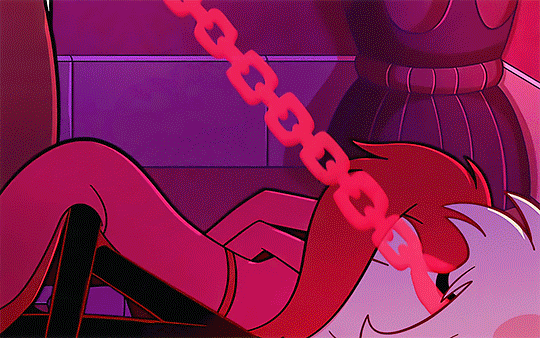
Valentino owns Anthony and has forced him in the persona of Angel Dust.
Alastor embodies the shadow, as he is linked to darkness (his powers make use of shadow-creatures):
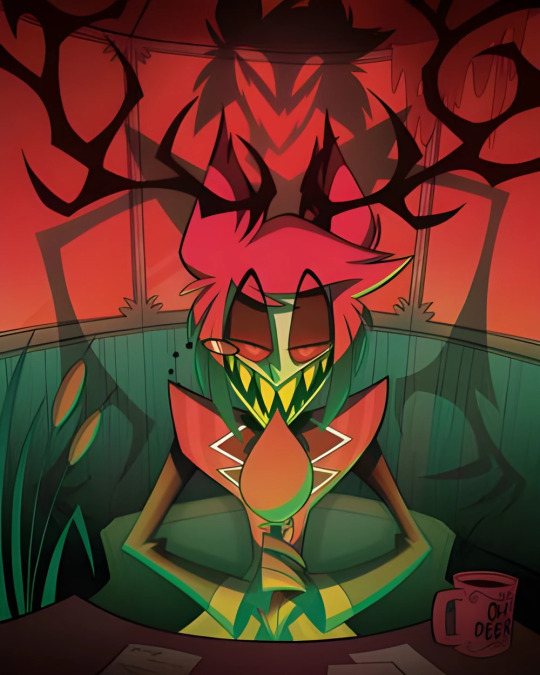
He represses his feelings behind a smile:
Alastor: A smile is a valuable tool, my dear. It inspires your friends, keeps your enemies guessing, and ensures that no matter what comes your way, you're the one in control.
As a result, his darkest instincts are slowly taking over, making him a threath to both others and himself:
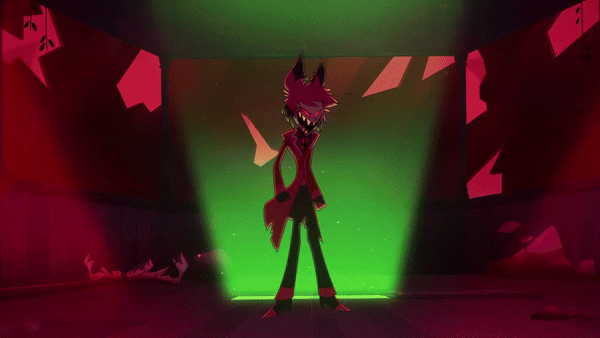
As Alastor hides his true intentions, his shadow grows bigger and more malicious.
The two demons perfectly sum up how dangerous the persona and the shadow can be, if left unchecked:
If one constantly wears a mask, it won't come off and will suffocate the person's self.
If one keeps on repressing their emotions, these feelings will grow stronger and find violent ways to come out.
Angel is a persona stuck to the face, whereas Alastor is a festering shadow.
The two characters' similar and yet opposite archetypes are so intertwined in Angel and Alastor's stories that they emerge in two additional ways.
1- Structurally
Angel is the only supporting character, who gets a whole episode dedicated to himself. He is the protagonist of Masquerade's A plot, whereas Charlie gets the B plot. He steals the spotlight (LIGHT)
Alastor is a character, who is never the protagonist of an episode. He gets development through the B plots, whereas others, like Lucifer, get the A plots. He thrives in the shadows (SHADOW)
2- Through Angel and Alastor's media motifs
PORN STAR AND RADIO DEMON
Angel is an actor, whereas Alastor is a radio host. These two medias tie into both the characters' bonds and identities.
Angel - The porn star
Bonds - In porn movies, actors fake pleasure on camera. Similarly, Angel Dust only knows fake love. He is trapped in unhealthy relationships and lets others exploit him. Be them Valentino or some random dudes in a bar:
Angel Dust: You don't think I can tell if someone spikes my drink? I do this all the fuckin' time!
At the same time, Angel himself approaches everyone in an overly sexual way:
Angel Dust: No activity requires more trust than BDSM, baby. No bond stronger than those formed through bondage!
It is not by chance that he suggests to bond through bondage. It is because for him sex equals bonds. However, this approach makes so he is unable to create genuine romantic relationships.
Identity - To act means to play the part of someone you are not, which is what Angel does all the time:
Husk: I see right through you and all this bullshit and how fake you are.
He hides behind his drag queen character to protect himself:
Angel Dust: Oh, please, baby. This body was made to be exploited. I got the arms, I got the stamina, I got the legs. I got the lung capacity. Oh, I got the legs. The gag reflex, the holes, the chest fluff everyone thinks are tits.
In other words, Angel's life is made of fake relationships (porn) and of a fake self (star). This characterization is perfect for a living persona.
Alastor - The radio demon
Bonds - Alastor's radio podcast is made of the voices of his many victims:
Mimzy: No one knew what happened to 'em, until these strange radio broadcasts started going out. All you could hear were screams. Every time an overlord went missing, there'd be a new voice screaming in the broadcast! That's when Alastor revealed himself as the radio demon, and anyone that would mess with him… well, let's just say, his broadcasts never lacked new voices.
He takes others' voices and souls to grow stronger. At the same time, it is implied Alastor has also the potential to amplify one's voice. This is why he symbolically shares his staff with Charlie and helps her go through to the Cannibals:
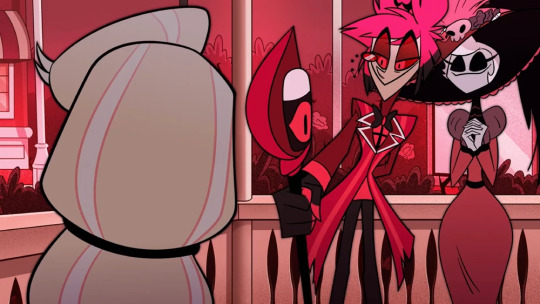
This fits the shadow, as this part of the self is simply what a character represses, both positive and negative. Similarly, Alastor can:
Manipulate others' insecurities and take advantage of them
Help others realize their hidden potential, so they can grow
Identity - Radio stars perform only through their voices and have no need to show their face in public. In other words, this media lets people hide in shadows. Similarly, Alastor uses the radio-filter to mask his voice:
Alastor: (with absolutely no static) What just happened? notices broken microphone …fuck.
So, Alastor hides everything of himself, both positive and negative, behind a filter. That is why he is a walking shadow.
Angel and Alastor's medias are important also to explore their relationships with Valentino and Vox.
Valentino is a cinema producer and director. He frames himself as the reason of Angel's success, while profitting of the porn star's acting career (producer). At the same time, he wants to control and direct every part of Angel's life (director). He is Angel's abuser both economically and romantically.
Vox is the TV demon and Alastor's rival. In the real world TV and radio fought to affirm themselves as the preferred media and the former eventually won. Similarly, Vox and Alastor's friendship turned into animosity. In the end, Alastor disappeared and Vox took over. Vox is the future. Alastor is a "has been".
At the same time, Valentino and Vox tie into Angel and Alastor's respective archetypes. In particular:
Valentino is the shadow character that complements Angel's persona symbolism
Vox is the persona character that complements Alastor's sadow symbolism
All these ideas are conveyed by two songs.
POISON AND STAYED GONE
Poison and Stayed Gone are similar in how:
They describe Angel and Alastor's relationship with a Vee
They play with medias (cinema, radio and TV)
They use shadow/light symbolism
Poison - Love potion
Poison describes Angel's bond with Valentino through what is basically a pop music video, which starts like this:
Valentino: And… action.
This is fitting, as Valentino controls Angel from behind the scenes, both as a director (public life) and as an abuser (private life). The song itself is a mix of clips that juxtapose porns and musical routines with scenes of sexual and domestic violence. This choice emphasizes the contrast between performance and reality, as well:
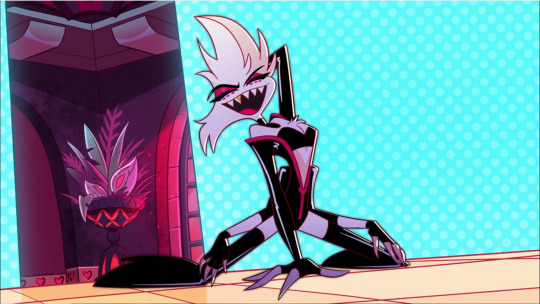
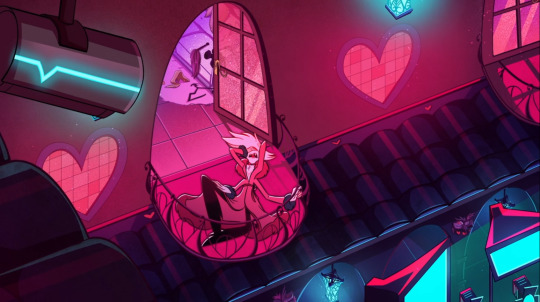
On the one hand Angel happily dances on-stage, enjoys drugs and money. On the other hand he screams in agony, while scared and trapped. At the same time, the lines between appearance and truth grow blurried. Angel is supposedly just filming a porn. However, as the song progresses, the violence becomes real and he is in pain as he is recorded. In the end, it becomes difficult to differentiate what's an act from what's not. Just like Angel struggles to separate his work-life from his personal life, pain from pleasure, persona from self:
I got so good at bein' untrue
I got so good at tellin' you what you wanna hear
I disassociate, disappear
He is untrue because he keeps wearing a persona (mask), which is why the song is full of references to the archetype.
Both in its lyrics:
Another lover underneath those flashin' lights
Another one of those ruthless nights
And in its visuals:
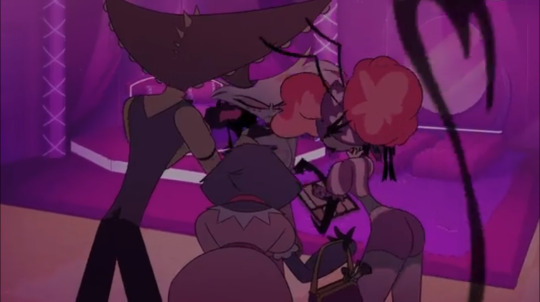
Before the video Angel's wounds are covered by make-up (a mask)
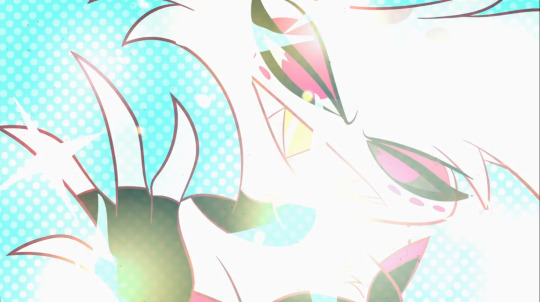
Angel sparkles on screen (light), while he is being dragged away by Valentino
Meanwhile Valentino is directly associated to the shadow:
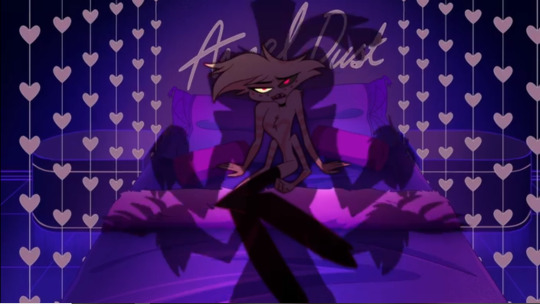
He is the beast threathening Angel and using the spider demon's worst instincts against him:
Yeah, I know it's poison
You're feedin' me poison
I'm chokin' from the taste and I can't help but swallow
Up your poison
I made my choice, and
Every night I'm wasted like there's no tomorrow
As a matter of fact Valentino encourages Angel's dependance on drugs to better control him. This is why "addiction" becomes a metaphor for his and Angel's relationship:
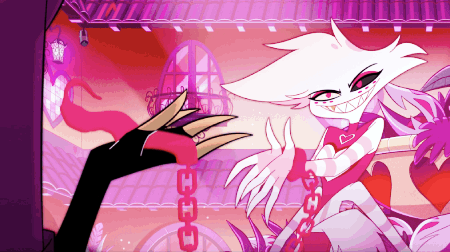
The red smoke Valentino uses to tie Angel to himself may be the secret ingredient behind the Vee's love potion.
Theirs is an abusive bond, a love potion which poisons Angel's life, but is too irresistible to escape.
Stayed Gone - Radio Killed the Video Star
Stayed Gone shows Vox and Alastor's rivalry through a duet that starts with TV:
Vox: Welcome home
I'm gonna make you wish
That you'd stayed gone
Say hello
To a new status quo
Everyone knows that there's a brand new dawn
Turn the TV on!
And ends with radio:
Alastor: Let's begin…
I'm gonna make you wish
That I'd stayed gone
Tune on in
When I'm done
Your status quo
Will know its race is run
Oh, this will be fun!
An inversion of what happened in the real world, where the superior technology conquered the market. As a matter of fact Vox is supposedly the future, whereas Alastor is "old crap":
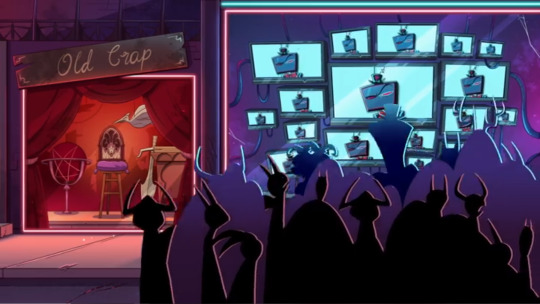
Vox: You're looking at the future!
He's the shit that comes before that!
And yet, Alastor wins the confrontation. Why is that so? That has to do with Vox and Alastor's respective jungian archetypes:
Vox is the persona, as TV is a medium where you are asked to show your face on screen and to appear in the light
Alastor is the shadow, as radio is a medium that let's you hide:
While he hid in radio
We pivoted to video
Now his medium is getting bloody rare!
This specific juxtaposition is referenced in the title of the episode itself. As a matter of fact Radio Killed the Video Star is a joke on the famous song Video Killed the Radio Star, whose main thesis was that new technologies like TV would have conquered the show-business and forced performers to expose themselves more. Radio instead is seen as a more safe medium because a person can avoid revealing their appearance. In other words, TV is the persona medium par excellance, while radio is the perfect shadow technology. So, Vox and Alastor's musical number is built on light and shadow imagery:
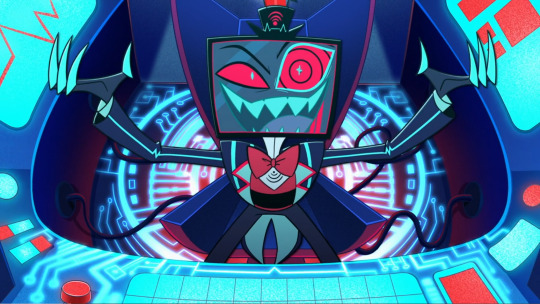
Vox starts the song speaking of a brand new dawn and switching the TV on, as the room gets full of light.
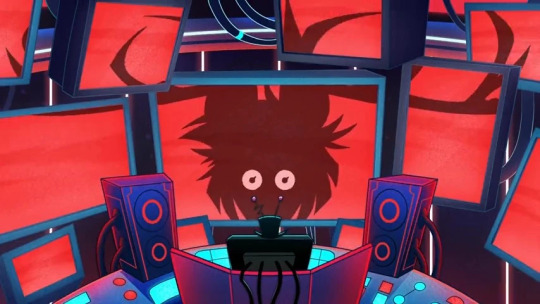
Alastor ends the song transforming into his demon form and appearing as a big shadow on Vox's monitors.
Vox puts up a self-assured persona, who breaks the moment Alastor reveals the TV demon's secret:
Alastor: And here's the sugar on the cream
He asked me to join his team
(Vox: Hold on!)
I said no, and now he's pissy, that's the tea!
Vox: (glitches) You old-timey prick
I'll show you suf-ffering!
Alastor: Uh oh, the TV is buffering
Vox: (glitches) I'll destroy yoo-o-u-u, you little—!
Alastor: I'm afraid you've lost your signal
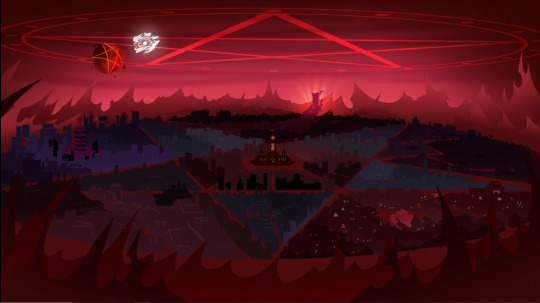
As a result, there is a black out. That is because symbolically Vox isn't able to accept his repressed emotions. So, the shadow takes over.
In other words:
Vox is the persona, the light, order and the future
Alastor is the shadow, the darkness, chaos and the past
A person can't face their future if they don't solve their past. This is true for Vox, but also for Alastor, who is clearly as angry at Vox as the Vee is at him. The difference is that ironically Vox is slightly more open about his feelings.
This is a big juxtaposition between Angel and Alastor, as well:
Poison is a song where Angel openly sings about his trauma and contradictions. It is one of the most introspective songs in the whole season 1 soundtrack.
Stayed Gone is the closest there is to an Alastor's song and yet it is not his. Vox starts the song and Alastor steals it. It is Vox who exposes himself, whereas Alastor reveals nothing.
In short, both Angel and Alastor repress themselves, but at least Angel can be honest, as he openly sings about his depression and desperation:
Poison, I'm drownin' in poison
I'm fillin' up my glass but it's always hollow
Full of poison, I'm sick of the poison
Wish I had somethin' to live for tomorrow
Alastor instead can't be honest, even as he sings alone:
"Great Alastor, altruist, died for his friends"?
Sorry to disappoint… That is not where this ends!
This contrast becomes clear in the two characters' reactions to the Hazbin Hotel's Old Wise Man:
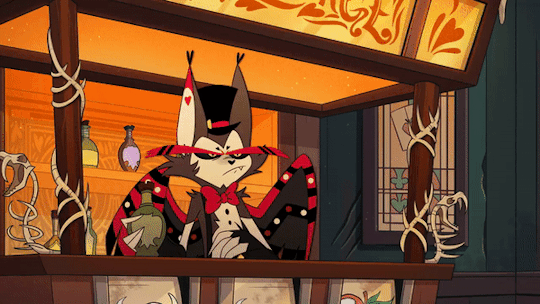
Husk: Everyone likes to bitch to the bartender. I know everything about you and these motherfuckers at this point.
YOU'RE A LOSER, BABY
Husk offers wisdom to others:
Angel Dust: Oh, I forgot. You're the wise old bartender who's seen it all.
He does so with both Angel:
Husk: Look, if you've got a problem, you're not going to find the solution at the bottom of a bottle. I should know, I've been looking there a long time.
And Alastor:
Husk: You and I both know Mimzy only shows up when she needs something. That bitch is trouble, and who knows what kind of demon she fucked with to come running to you this time?
However, the two demons react in opposite ways.
Even if initially Angel gets angry at Husk, he eventually understands he and Husk are suffering a similar fate:
Husk: I was an Overlord once, you know. Yeah, and uh… It was nice to have that power. But when you're dealing in souls while also being a gambler, the stakes are pretty high. And losing a few hands can be more than a little dangerous. So when you're down on your luck, you turn to anything to…Keep you afloat. Even making deals yourself. So I know what it's like to… Regret the choices made… And knowin' ya can't take it back.
Even if eventually Alastor follows Husk's advice about Mimzy, he refuses to accept he and Husk are just the same:
Husk: Big talk for someone who's also on a leash.
Husk challenges both Angel and Alastor with the same knowledge: everyone in Hell is a loser. Angel might be a celebrity and Alastor a powerful overlord, but both have screwed up and are paying for their mistakes. If they admit it, though, they might find someone ready to help them, even in Hell:
Angel Dust: You're a loser, baby
Husk: A loser, but just maybe if we
Both: Eat shit together, things will end up differently
Angel sees a mirror of himself in Husk and chooses to empathize with him:
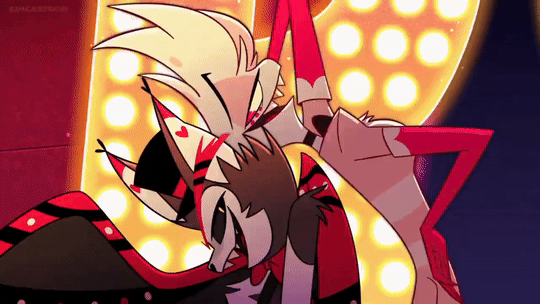
Angel Dust: I'm a loser, honey
A schmoozer and a dummy
But at least I know I'm not alone
Husk: You're a loser
Both: Just like me
In this way, he can start accepting himself and can take off the mask suffocating him.
Alastor is confronted by his most vulnerable part in Husk and chooses to treat him cruelly:
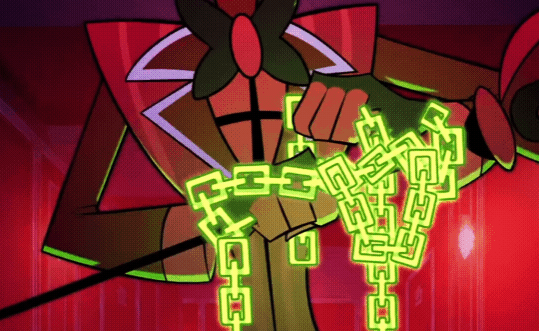
Alastor: If you ever say that again, I will tear your soul apart and broadcast your screams for every other disrespectful wretch who dares to question me!
This means he isn't ready to integrate with his shadow. He can't face his most disliked and repressed side.
At the same time, Angel and Alastor's respective interactions with Husk highlight another foiling they have:
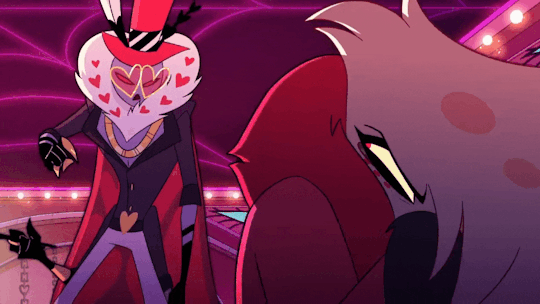
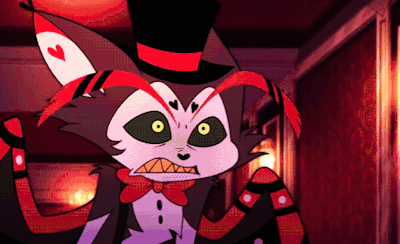
Angel is abused and controlled by Valentino. Alastor abuses and controls Husk. In other words Angel is a weak prey, whereas Alastor is a strong predator.
PREDATOR AND PREY
Angel is Valentino's prey, whereas Alastor is a predator of souls. This comparison can be explored in two different ways:
Angel and Alastor's foiling with respectively Vox and Valentino
Angel and Alastor's animal motifs
1 - Dark foils
Angel's conflict is with Valentino and Alastor's is with Vox. However, Angel foils Vox, whereas Alastor foils Valentino. As a matter of fact Angel and Vox are both self-made preys, while Alastor and Valentino are both wannabe predators.
Now, prey might be a little too strong for Vox. Still, what I mean is that both Angel and him are trapped in abusive relationships with Valentino. Sure, Angel's one is particularly bad because the difference in power is bigger:
Valentino: You think she can get you out of work? You know she can't do anything. I own you. Or have you forgotten that?
Angel is not only Valentino's romantic interest, but also his employee. Valentino literally owns Angel's soul and can do with him what he pleases.
Vox and Valentino are instead more or less on pair. However, there are hints about their bond being unhealthy:
Vox: 'Oh god. Here I go, Valentino.' Just another fucking day with Val. Hey-hey-hey. Fuck my life.
The Vees' introduction has Valentino violently lashing out and Vox being forced to deal with him. It is obvious their partnership has toxic undertones.
In short, Angel and Vox are sexually and romantically tied to Valentino, but deep down dislike him. And yet, they don't leave him. This happens because both have frail identities they mask with happy and self-assured personas.
So, Angel acts proud of his porn movies, but deep down he is unsure of who he is and believes he isn't strong enough to change:
Valentino: You actually think you can change? Addict trash like you doesn't change. I'll see you soon, baby.
Vox instead behaves as a successful businessman, but he is actually scared he would be nobody without his alliance with Valentino and Velvette:
Alastor: Is Vox as strong as he purports?
Or is it based on his support?
He'd be powerless without the other Vees!
Angel thinks he can't leave and Vox chooses not too. Still, both are limited by weak senses of self. They force themselves to play the prey.
When it comes to Alastor and Valentino, both are predators of souls. They prey on weaker demons, like Angel and Husk, but they also try to make contracts with stronger beings.
This is shown by the way they interact with Charlie:
Charlie: I'm taking your offer to help. On the condition that there be no… tricks or voodoo strings attached.
Alastor: So, it's a deal, then?
Charlie: Nope! No shaking! No deals! I… hmm… As princess of Hell and heir to the throne, I, uh, hereby order that you help with this hotel. For as long as you desire.
Valentino: Welcome to my humble sex dungeon. What can I do for such a-- Mm! Lovely specimen! You don't want a role, do you? Because I can make you a star, make us both richer than, well, your papito--
They meet the Princess of Hell and offer to enter partnerships with her, so that they can use her. Obviously Alastor is intended as a gray character, while Valentino as a pitch black one. However, they are pretty similar in how they manipulate others:
Charlie: How? I'll do anything.
Alastor: Anything? Then… let's make a deal.
Valentino: Put something inside them. That's how I get the bitches to behave.
Alastor takes advantage of Charlie's self-hate and desperation to force her into a pact. Valentino uses drugs to make his employees dependant on him. And yet, they are both far from unstoppable.
Vox: Heh. What are you doing, Val? You're not going over there.
Valentino: That slippery twink is gonna remember who owns him. I'm gonna FUCK everyone in that rancid shit hole, I swear to god!
Vox: VAL- Hehe. Think about it.
Alastor: it's nothing I can't handle. Don't worry Husker. Who in their right mind would cross me?
Husk: I mean, you've been gone a while, and it's not like anybody knows why.
Valentino is impulsive and leaves obvious loopholes in his contracts. Alastor is smarter, but he is not as feared or as strong as he would desire. They like the feeling of power, but their control over others is not as firm. A moment may be all it takes for them to become preys. They give in to violence and behave like beasts because they wanna make sure they stay predators.
Vox and Val are darker versions of Angel and Alastor. They are who the two hazbins might become if they don't fix their flaws:
Vox is a person who chooses to appear strong (persona) over being happy
Val is a slave of his worst instincts (shadow) and has no genuine relationship whatsoever
At the same time, it is clear the dychotomy between prey and predator isn't as cut and dry.
2- Spider and Deer
Angel is a prey and Alastor is a predator. And yet, their animal motifs say otherwise:
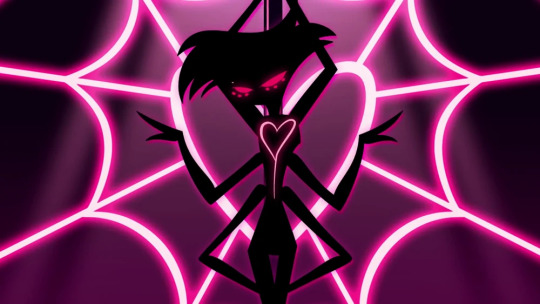
Angel is a spider, a predator.
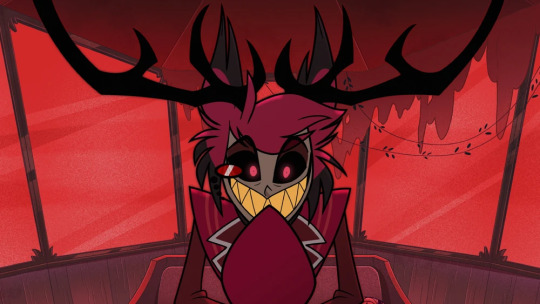
Alastor is a deer, a prey.
Why is that so?
That is because Angel is repressing his most powerful and aggressive side. Alastor instead is hiding his most frail and vulnerable part.
Angel comes from an influent criminal family to the point that his spider motif alludes to their wide web of criminal activities. As a result, he lives a violent life, but chooses to distance himself from it in Hell. According to Word of God, he decides to leave violence and fighting (Anthony) behind to explore sexuality and love (Angel Dust). However, the end result is that he is now trapped in a different way. As a human, he is forced to cultivate his most masculine traits. As a demon, he is valued only for his feminine ones. So, Angel is a porn star, who hides a strong fighter:
Angel Dust: Eat lead, sucka!! I told ya. I can handle myself baby.
Angel pulls out 5 extra guns and begins fighting the rest of the demons with Husk tuntil all the shark demons are reduced to blood and guts.
Husk: Well, that was something I didn't expect to see.
Angel Dust: Like I said, you don't know me. Sex ain't the only thing I'm good at.
Husk: Good to know, cause this guy ain't that bad.
He is a spider tired of his own web, who ends up prisoner of a moth. The challenge is for him to reconcile his two sides (masculine and feminine) and to find people who accept him as a whole person. He must forge a brand new web of healthy and supportive bonds.
Alastor is a radio host and a serial killer who buries his victims in a hunting ground only to be mistaken for a deer and killed. In Hell he chooses to live as he did on Earth to the point he doesn't even change his name. He keeps being both a radio host and a serial killer. He simply fuses his two sides and becomes the Radio Demon. And yet, he is just repeating the same pattern, where he goes from predator (serial killer) to prey (deer). So, he is an overlord preying on overlords, that ends up on the receiving end of a detrimental pact. Symbolically, he hates this part of himself so much that he committs "cannibalism":
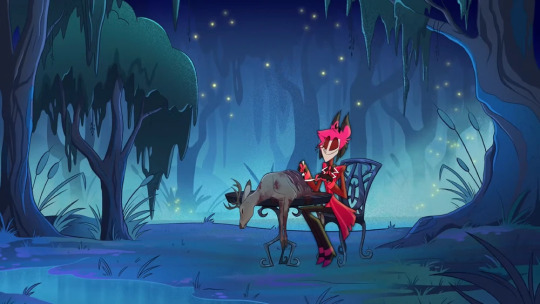
He is a deer who eats deers because he can't phatom he might end up on the plate himself. He needs to feel a predator no matter what. And yet, he is a prey deep down and if he could just admit it and ask for help he might change his situation. If he accepted to step into the light and open up he might grow stronger. And yet, he is too proud and too scared. A deer frightened and confused by the headlights, who prefers to hide in shadows, where he feels safe and untouchable.
So, Angel is a prey who hides a predator, while Alastor is a predator who hides a prey. Throughout the season, these repressed parts start emerging.
Positively for Angel:
Angel Dust: Fuck off, Val.
Valentino: Excuse me?
Angel Dust: I said fuck off! I may have to put up with your bullshit, but you ain't fuckin' with any of my friends!
Valentino: You forget who you're talking to? I own you, bitch.
Angel Dust: Yeah, you do, in the studio. And you can do anything you want to me there, just like our deal says. But out here, I get to do what I want. So once again, FUCK. OFF.
He manages to slowly free himself of Val's toxic influence and by the end he stands up to his abuser. The spider is growing stronger and soon the moth won't be a problem.
Negatively for Alastor:
Adam: I'm going to wipe that shit-eating grin off your face, CAUSE RADIO IS FUCKING DEAD!
Adam flies a few metres into the air and swings his guitar, sending a shockwave towards Alastor. When it dissipates, Alastor has been forced out of his full demon form and his microphone has been snapped in two.
He slowly loses control of his situation to the point that by the end he miscalculates so badly he is almost killed by Adam. The deer can smile as much as he wants, but in the end he can't escape stronger animals.
SAME PROBLEM, OPPOSITE RESOLUTIONS
Angel and Alastor share the same issue. They both can't accept themselves. However, throughout the season their stories go in opposite directions.
Angel makes progress in self-acceptance, so he can start cracking his persona:
Husk: Last day of afterlife, and you're not off snorting a line off some hunk's abs?
Angel Dust: Eh, you fucked one cannibal pool boy, you fucked 'em all.
Husk: I guess you have changed.
Angel Dust: Hey, Charlie said live tonight however we wanted… so pour me a fresh one, and let's get to living!
Alastor refuses to face who he is, so he gets engulfed by the shadow:
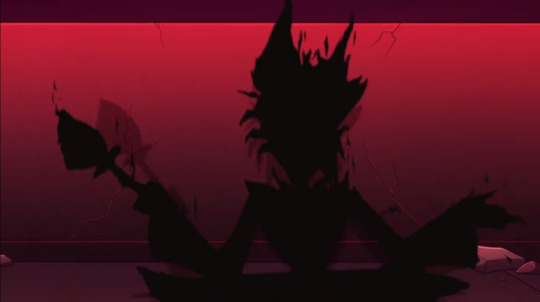
It will be interesting to see how their parallel arcs will keep on going in future seasons, how their intertwined conflict and foiling with the Vees will evolve and which role they will have in Charlie's story.
FOUND FAMILY
Angel and Alastor are the first two demons to join the Hazbin Hotel and they grow into members of Charlie's found family:
Alastor: They say the family you choose is better!
In particular:
Angel is set-up to become a sibling-like figure (he clearly projects his feelings for Molly on Charlie)
Alastor is framed as an evil mentor and a parental figure (his foiling with Lucifer makes it obvious)
At the same time, they are meant to challenge Charlie in different ways:
Angel is a protector (angel), who forces Charlie to deal with her pollyanna persona
Alastor is a dangerous manipulator (devil), who has Charlie deal with her repressed shadow
This is made clear in the episodes Masquerade and Hello Rosie:
Charlie: Okay… I could be so aggressively kind to Angel's boss… That I convince him to let Angel spend more time at the hotel!
In Masquerade Charlie is confronted by Vaggie about how much she repressed her aggressivity. For Angel's sake then Charlie tries to wear an "aggressively kind" persona, but it feels fake and it leads to a mess.
Charlie: flips Susan off FUCK YOU, YOU OLD BITCH!!!!!
In Hello Rosie Charlie is overcome by her negative feelings to the point she gives in to Alastor's request to make a deal. However, as the episode goes on, she manages to face her inner emotions and to grow more decisive:
Charlie: It's a feeling like a rumbling in your gut
That you could finally be faced with
A billion needy faces, I guess what I mean to say is
For the first time in my life
I might have to be ready for this
Ready to be the one who's leading from the front
Gotta come into my own
Gotta come into my throne
Gotta take charge and defend my only home
And although I kinda feel unsteady
Now I need to be ready for this
In short, Charlie herself wears a persona and has a strong repressed shadow. Angel and Alastor are the two characters who will help her face these parts of herself, so that she can grow into a powerful Ruler of Hell.
#hazbin hotel#hazbin hotel meta#hh meta#angel dust#alastor#alastor the radio demon#alastor hazbin hotel#hazbin hotel vox#hazbin hotel valentino#my meta
33 notes
·
View notes
Text
Is Misty a serial killer?
"I’m grateful, okay? I really am very grateful that your hobby seems to be figuring out how to be the perfect serial killer."
"Why does everyone keep saying that?"
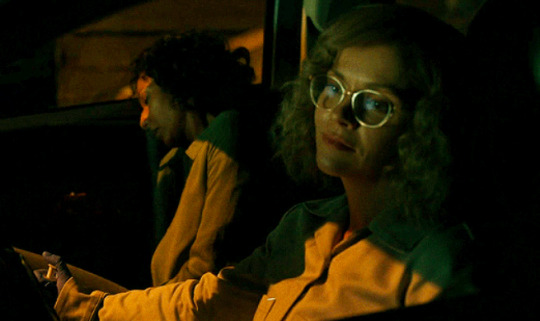
Misty is such a fascinating character. We know that since they were rescued, she's become a nurse/carer at a nursing home, that she's a prominent member of the Citizen Detective group, that she loves her bird Caligula and is training him, that she's gone on a lot of unsuccessful dates, and that she's kept tabs on all the surviving Yellowjackets.
But none of this explains the murder dungeon set up in her basement...
For context, Misty's had a fascination with medicine and healing since before the crash, taking the Red Cross babysitter's first aid course twice, but it's after the crash that she realises how useful this skill is in making her needed and letting her be in control.
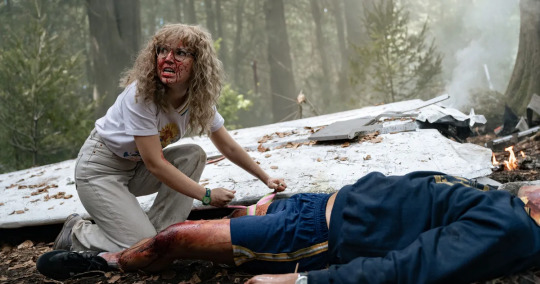
It gives her power over people.
Her feeling appreciated for the first time in her life and feeling like she has a position of power in the group leads to her destroying the black box when she finds it. I'm not sure if she just meant to delay the rescue to give herself more time to shine, or whether she meant to trap everyone in the middle of nowhere permanently.
Even if her plan was just to delay, Ben is in a critical state, and everyone is injured and vulnerable to infection and exposure, not to mention their lack of supplies (Misty has no knowledge of the lake or cabin at this point). Either way it shows a complete disregard for others lives right from the get go.
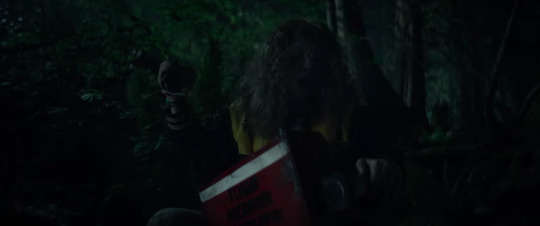
Misty doesn't know much about herbs and plants when they're first in the wilderness, Akilah is the most knowledgeable from her time in the girl scouts. But Misty obviously pays attention, and she gathers plants into a binder that she secretly hides in the woods.

In her binder there is also a book on medicinal plants. As pointed out in this reddit thread, it looks faded, has no hole punches for the binder, and there's no reason Misty would have this with her in the crash. It's likely a book from the cabin. Instead of having it available for everyone, Misty has hidden the book so that only She has the knowledge - she's the one with the power, she's the most useful, and she appears to just know this information.
The plants in the binder include the ones that make you sick and hallucinate - you can see the 'vomiting' label! And this is not to know what to avoid, she gathers enough to use - which she does! It's completely premeditated.
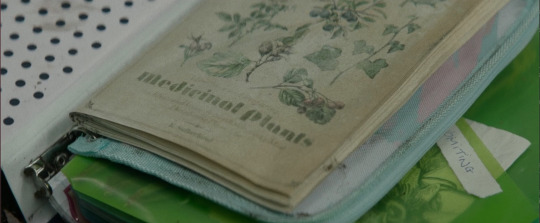
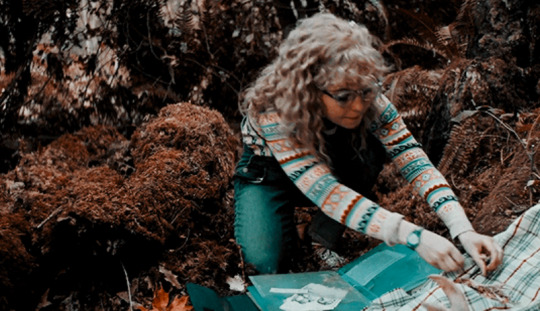
Misty's eager to control Ben and poisons him when he appears to reject her advances. When she thinks she has a chance with him at Doomcoming she excitedly goes to drug him into a state of compliance. Her plan is ruined before she can attempt it (though I doubt Ben would've ever accepted another tea from Misty lmao) when Mari adds the shrooms to their stew. Misty knows that Everyone is going to be drugged and there will be consequences - but she says nothing and even has the stew herself in order to try and appear innocent. So she knows it's not something someone's supposed to be doing but does it anyway for her own gain.
"You poisoned me! Why?"
"That's a very strong word. I wouldn't-"
Chronologically, the first death that Misty directly causes is Kristin's.
Misty threatens to kill her if the other girl reveals her secret (destroying the black box) and backs Kristin up against the cliff. When Kristin steps back, she falls to her death.
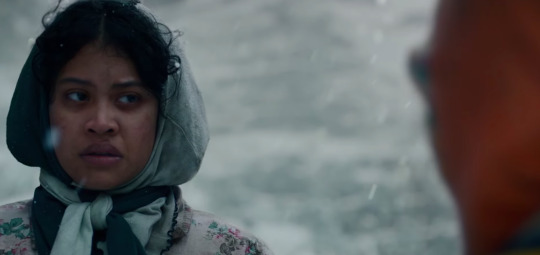
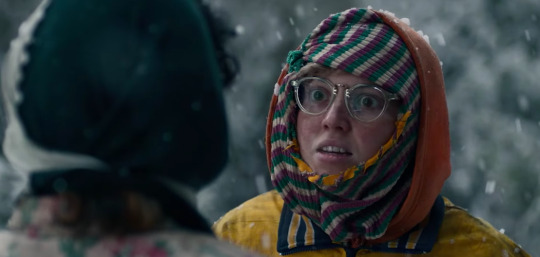
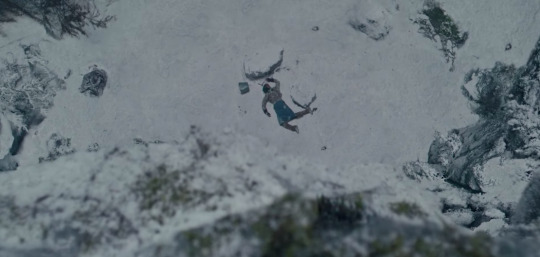
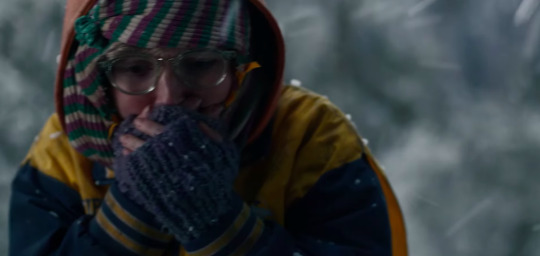
I truly don't think Misty meant to kill Kristin here. I think she was 100% capable of it, but her actual death was an accident. Misty panicked and was trying to gain control of the situation. Misty is in shock after Kristin falls off the cliff, she's devastated and climbs down and does CPR to try and save Kristin. Absolutely not a death she meant to occur, but despite her grief, Kristin's death does solve a problem for Misty.
Something that she'll remember going forwards.
The next death Misty is (at least partly) responsible for is Javi's. Misty is the one who relays Lottie's wish to be used as food if she dies, this causes the group to decide to sacrifice someone in Lottie's place. Natalie draws the card, Travis and Javi help her escape, but when Javi falls into the icy lake, Misty is the one to pull Natalie back from helping him and make it clear that it is Natalie or Javi's life and he is already drowning.
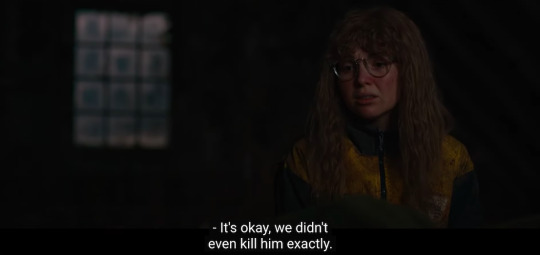
Misty also has complicated reactions to death. She immediately covers up Kristin's death with the blizzard, knowing that she'll be blamed if anyone discovers she fell from the cliff. But she's also panicked and upset and berating herself. She makes justifications for Javi's death and looks way too intrigued when Travis bites into the heart. But in contrast - Misty's devastated when the baby dies, and she actually convinces Ben not to commit suicide because "I can't have another death on my hands"
Yet Misty is also enamoured with violence - looking positively gleeful as Shauna nearly beats Lottie to death and grinning after they feast on Pit Girl.
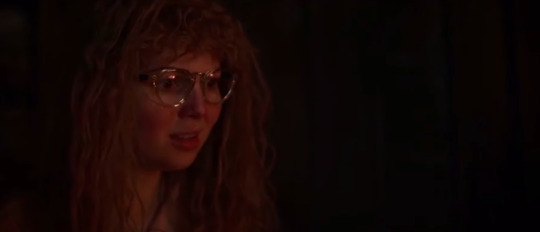
At this point this is as much as we've seen of Misty in the '96 timeline but it's... troubling. Especially considering what she's like in 2021.
Misty's become a nurse, working in an aged care facility, where she can play God and have control over people's lives again without any real oversight.
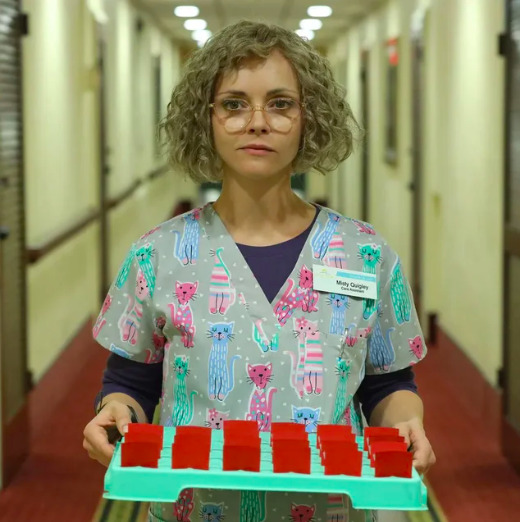
But none of this makes her a potential serial killer. What does is:
1) Her basement.
Misty kidnaps Jessica (we'll get into that) but she already has a basement set up for this exact need. A bed, TV and kitchen facility in a basement isn't usually suspicious - but we know that Misty has ZERO guests staying (willingly) with her, the basement only locks from the outside, it's already set up with restraints on the bed (potentially just kinky but given the context more murdery), a wheelchair that someone can be easily handcuffed to, duct tape, etc.
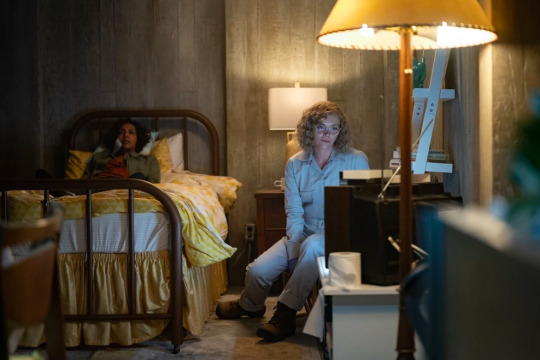
There's also other details that show that... this is not the first time Misty has done this. She gives Jessica plastic cutlery like what a child would use (unlike the metal cutlery Natalie uses to stab Lisa and escape when she's kidnapped and chained to a bed). Misty wears gloves and a full jumpsuit to conceal her DNA and a pair of work boots that are clearly for this purpose only.
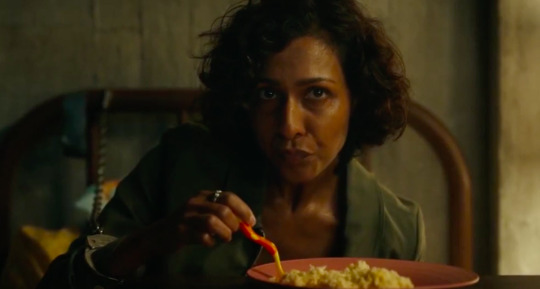
Even knowing that Misty is a researcher, is fascinated by true crime and is a citizen detective, there's just too many details in the set up for this to be a one off thing and first time success.
2) Misty's knowledge, supply of, and willingness to use drugs.
Misty kidnaps Jessica in about ten seconds. She's convinced Jessica to willingly get into her car to discuss what they talked about on the phone, and without a word Misty stabs her in the thigh with a syringe and knocks her out. Then Misty drives away with a smile. hm.
After discovering that Jessica will be harder to crack then Misty thought, she's perfectly willing to... murder Jessica's father. By lacing chocolates with a deadly drug and sending them to the guy from his daughter. Misty even gets his nurse to agree to deliver them personally sjdlk;fhaskl;dfh holy shit??
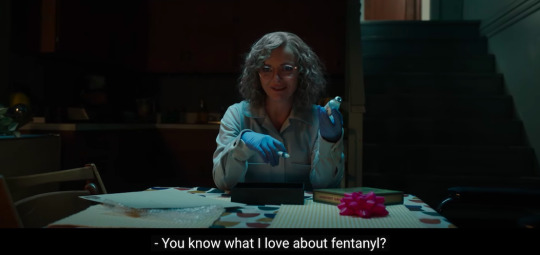
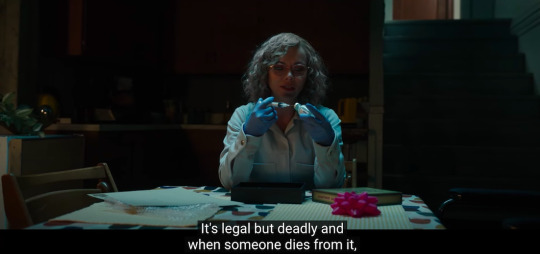
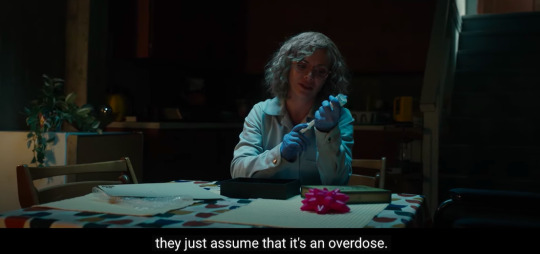
Drugs are Misty's weapon of choice. It's another thing that gives her power over people. She laces Jessica's cigarettes, murdering her, when Lisa shows up with a shotgun to try and get all the masked armed people away from Lottie, Misty's first instinct is to kill the girl. The only reason she doesn't succeed is that Natalie covers Lisa and sacrifices herself.
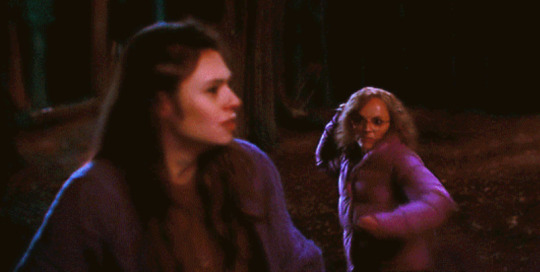
So in the adult timeline - that's one straight up murder (Jessica), two attempted murders (Lisa and Jessica's father), and one accidental-ish killing (Natalie). All with drugs.
3) Misty's manipulation and lack of boundaries
Not as big of a reason as some of the others, but important to consider overall. Misty has no boundaries with other people, and uses her skills against everyone around her, whether she thinks of them as a friend, foe, or a complete stranger.
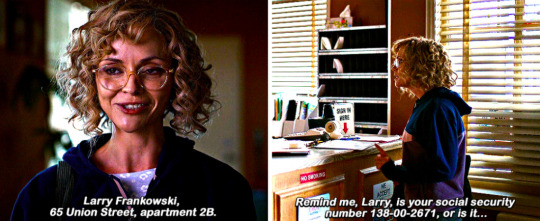
She keeps tabs on the other survivors, including Travis, who changed his name and disappeared. She's disappointed in herself for not knowing Lottie was back from Switzerland.
She tampers with her own car to guilt her date into driving her home, then guilts him into coming inside by crying that he doesn't think she's pretty.
She tampers with Natalie's car in order to force Natalie into going with her to find Travis.
She texts Kevyn Tan pretending to be Natalie and starts up a relationship with him (i mean acab but still bad from natalie's perspective)
She puts a hidden camera in Natalie's room in order to spy on her, listening in on her conversations and watching her have sex (girl come on.)
To threaten Jessica, Misty finds out the aged care facility her father is in, who his nurse is, and using a fake name has a lengthy conversation with the nurse to find out as much information as she can.
Misty does a whole background check on the random motel employee in order to threaten / blackmail him into helping her.
Not to mention all the ways Misty abuses the residents in her care at her job.
4) She knows exactly how to get rid of a body
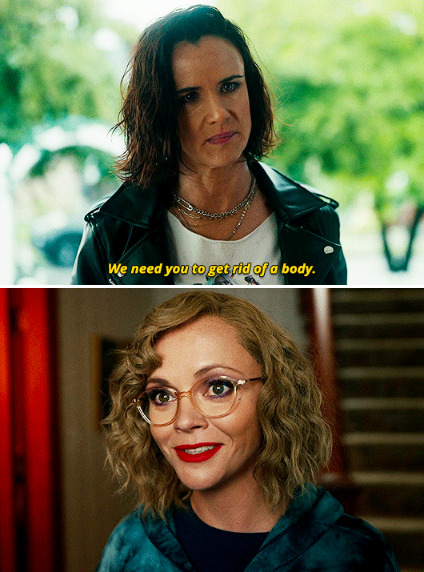
She's so flattered I just-
Once again, because she's a Citizen Detective and loves true crime I can see her knowing a fair bit about this. Like the 'fun fact' that 12% of killers are caught buying cleaning supplies. Why she knows exactly what brand of bleach is best to clean up a murder because "regular bleach leaves behind hemoglobin for the luminol tests" is not something anyone who has not cleaned up a murder scene would know. Also she knows exactly what to steal from her work to clean up a murder scene and dump a body on short notice...
A lot of things that Misty still uses are things that she learnt in the wilderness - the drugs, the manipulation, etc. Cleaning was not a part of the wilderness. This and her murder basement are things she has learnt over time since they've been back.
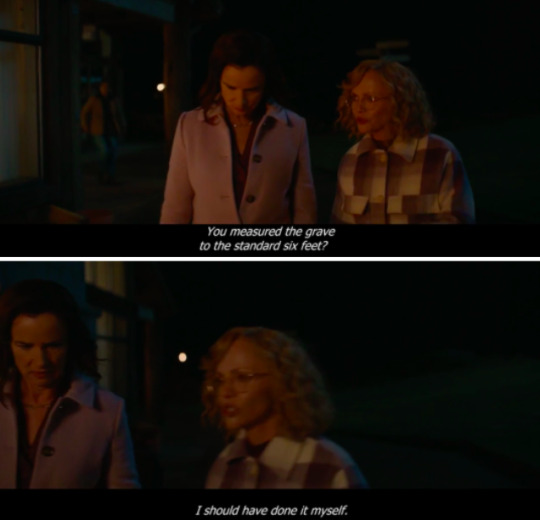
She's also so upbeat?? All of the survivors have dealt with bodies, but for most of them it's been a while and they're all pretty shaken when getting rid of the evidence of Adam's murder. Misty is practically glowing - but given that her 'friends' need her and that she's in charge, that tracks for her character.
So after all this, there's still the question:
Is Misty a serial killer?
Honestly? Yeah, probably. She has far too many resources and techniques and is just far too comfortable with murder and cleaning up afterwards to have not killed at least a few people that we don't know about. A serial killer is someone who has murdered at least three people over a period of time. I'm thinking Misty qualifies.
Then there's the question of why?
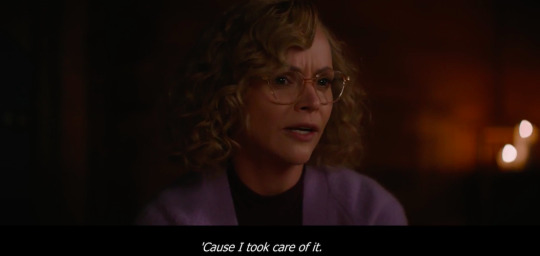
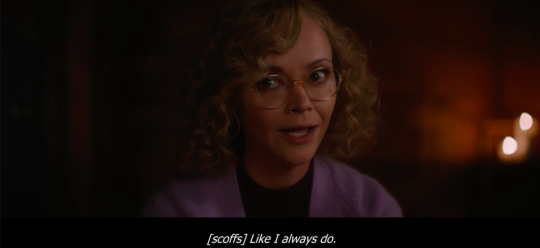
Misty thinks of herself as a hero. The underdog who's protecting her friends, especially Natalie. She's doing what needs to be done when the others aren't able to.
And it's the phrasing of the quote above that really gets me. The 2021 timeline in both season 1 and 2 takes place over only a couple of weeks. The bulk of it - from Jessica's kidnapping and the blackmail to ending up in Lottie's compound - happens over about two weeks.
In that two weeks, Misty has (according to herself) taken care of things such as: helping Natalie find answers on Travis' death, stopped Natalie from relapsing, killed Jessica and neutralised a potential threat, helped the others cover up Adam's murder & tracked Natalie down after her kidnapping.
Only they really didn't find answers on Travis' death, Adam's murder was not covered up and Shauna is being investigated, and Natalie stayed willingly with Lottie. The other two are highly debatable.
So Misty did not take care of things. Also, "always" is a strong way to phrase a two week period. Considering she hasn't seen the other survivors in years.
So is Misty... not talking about that two week period? Is she talking about before?
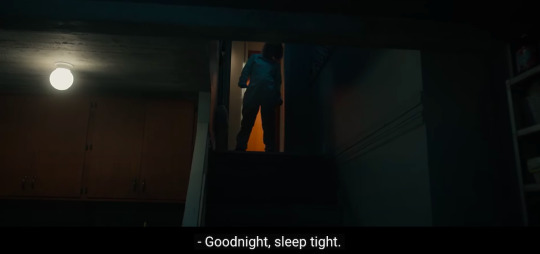
The Yellowjackets and their survival have been public speculation since their rescue. Jessica pretending to be a reporter and poking around for a story is not shocking to any of them. But no official story has ever come out. Maybe Misty has been "taking care" of any potential leaks.
Has anyone checked in with the author of 'Skin in the Game' i'm just saying
She already has the basement set up for interrogation. She already has the drugs on hand to make a murder look like an overdose. She would rather kill someone then deal with the consequences of them living. Take Jessica, or the fact that Misty used a lethal drug (probably the fentanyl) when attacking Lisa, when she could have easily used some sort of tranquilliser.
There's also the fact that she just enjoys having power over other people. She enjoys violence.
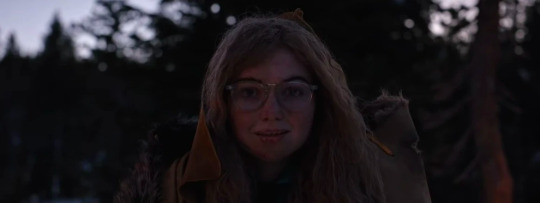
Some theories:
There's Stan, the guy she went on a date with in 1x02. It's obvious the date is going terribly. Misty is trying way too hard and he's not into her but she keeps pushing. That is in character, and maybe they're just trying to set Misty up as being desperate. But also... the guy is kind of a loser. He's just been fired, he tries to ditch the date at 6PM, he's even more awkward then Misty. But she still messes with her car so he has to give her a ride home. She still manipulates him into coming inside.
Why? Why does she want this guy in her house? To try to convince him to have sex with her? She doesn't really seem that into him either. And once Natalie turns up Misty could care less about the guy.
Maybe Misty was looking to use her murder basement. This guy just lost his job, if he disappeared would anyone notice right away? If he turned up a week later, dead of an apparent overdose, would anyone suspect anything? Misty sees herself as being noble, when she kidnaps Jessica she taunts her saying "good night, sleep tight, don't let the fact that you're a terrible person keep you up tonight". Stan was a jerk, so would Misty justify her actions to herself because of that?
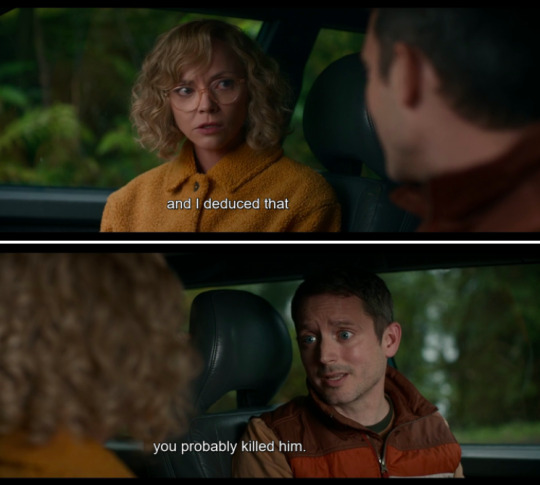
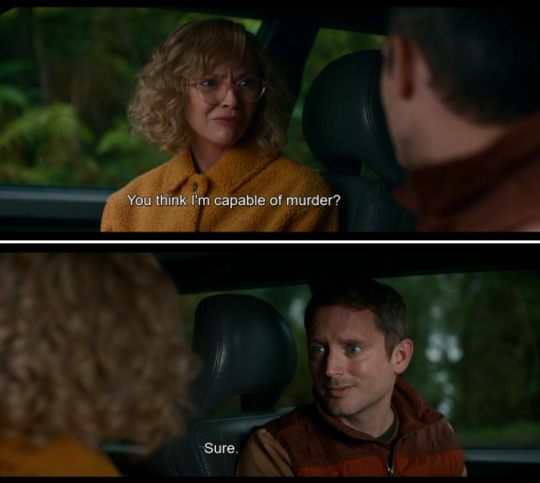
Then there's Walter. He knows more about Misty then he's letting on. He may have found her on the citizen detective boards, but even with his odd behaviour, this doesn't explain his borderline obsession with her. When covering up Adam's murder, he's also covering Jessica's. How does he know about Jessica or that her murder relates to Misty? He's very into true crime - has he tracked Misty down because he's linked her to several suspicious deaths? It clearly doesn't bother him, it actually seems to be something that endears her to him, but it supports the serial killer theory. Also hilarious that he thinks her being a surviving Yellowjacket is the least interesting thing about her and... he's right actually jsldkfhsaldhfas;hf
At the end of the day, Misty Quigley is a fantastic and fascinating character and I can't wait to see where her story goes. I would love for this theory to be true, but either way I'm sure Misty will be as entertaining as ever.
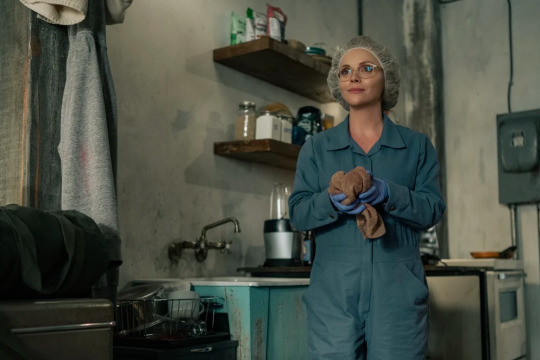
"I know when you look at me, you don't see someone you should be afraid of, but, uh... you're wrong."
#misty quigley#yellowjackets#meta#analysis#theory#my meta#my post#jessica roberts#walter tattersall#cw serial killer#cw murder#cw kidnapping#cw drug use
31 notes
·
View notes
Text
It’s funny how Azula antis might call Azula “irredeemable” or say “Aang should’ve taken her bending away” as if Zuko or anyone else couldn’t have been the same way or worse if they were in they were in the situation she was in. They also completely miss the whole episode with Roku that shows anyone, ANYONE can be good or bad. Fire Nation or not. If Iroh, a grown man- or Zuko, a 16 year old boy can turn good and realize what they did was wrong then a 14 year old misguided girl can. I mean, don’t get me wrong- she’s done many bad things and is an objectively worse person than Zuko. I’m not denying that, however I’m just saying- she did have some humanizing moments too, it’s confirmed she does love Zuko along with Ty Lee and Mai, oh- and has basically been receiving fake “love” by her god forsaken father. I can see why her perception of life and love may be fucked.
Did I forget to mention she’s only 14 and has been misguided her whole life?
#anime#avatar the last airbender#atla#analysis#avatar#character analysis#media literacy#atla meta#my meta#meta#avatar meta#azula meta#fire siblings#princess azula#azula#azula atla#azula deserved better#zuko#iroh#fuck ozai
38 notes
·
View notes
Text
I like the way the girls and the boys kinda mirror each other in different ways
There are the obvious ways, like Crystal having Charles' bolder energy and sharing his past of having had friends who didn't actually like her much. And then, of we're going to assign Edwin as autistic, Niko is right there with him with her flatter affect and the way she doesn't always remember how social cues work
But then as Charles points out Crystal shares Edwin's slightly stubborn streak and kind of abrasive tendencies (though muted) and Niko is much more optimistic than Edwin and has the same habit of smiling most of the time as Charles (although like Crystal, she has a muted version of Charles' qualities)
I like the ideas that the boys bond with the girl who is most like them, but the qualities they most appreciate in them seems to be the ones they share with the other boy
31 notes
·
View notes
Text
LET'S TALK ABOUT LOKI'S SHOES (ACTUALLY, HIS WHOLE WARDROBE)
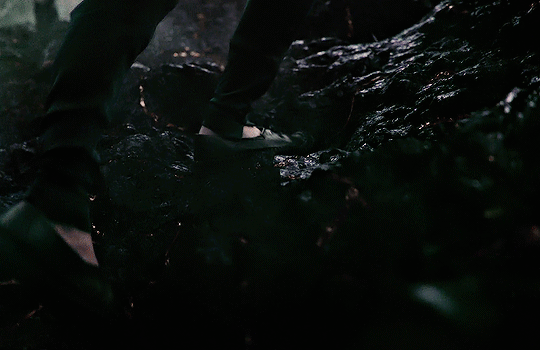
Production costs aside, clothes tell the audience about how characters think of themselves.
Loki's shoes in the S2 finale raised a lot eyebrows, but I find them quite fitting: they are comfortable, practical, and most importantly, they are humble. The camera brings this to our attention to communicate his evolution in character.
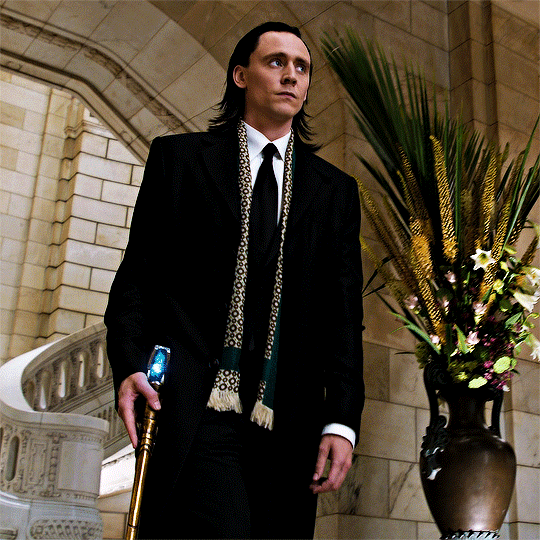

Loki has always dressed well, often times ostentatiously. Whether he is at war, passing as a Midgardian, or held captive as an Asgardian prisoner, Loki communicates his social class and sense of superiority through clothing. For him, clothing armors his fragile sense of self and against others' opinions of him. He intends to be perceived as deadly charming but ultimately unapproachable.
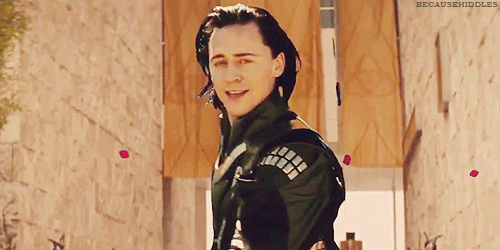
His attire in the first Thor movie is roughly equal parts green and gold, signifying his royal status. His style is dressed down for his brother's misadventures in Jotenheim, yet overall both silhouettes are lofty, princely, but not hardened or threatening.
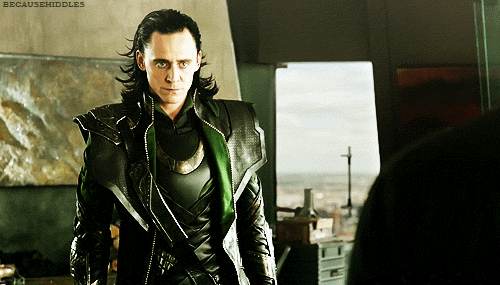
In Avengers, Loki's look has more black and leather, with exaggerated emphasis on his shoulders meant to intimidate as he assumes the role of villain. The silhouette is very hard, heavy, and edgy. Gold detailing is prevalent as well. Combined with the goat's helm, this is Loki's most pretentious outfit, which speaks to an undercurrent of low self-esteem and a compulsive need to impress. There's no mistaking he is the main antagonist of the story.

In Thor 2, Loki's attire is similar to Avengers but the overcoat is exchanged for a less bulky version (perhaps conveying he is less guarded now that the effects of the Mind Stone are no longer influencing him). Loki's role likewise pivots from the harsh lines of a villain to the more flexible edges of a reluctant villain-turned-ally. This aligns with his character arc when he protects both Jane and Thor, seemingly sacrificing himself.
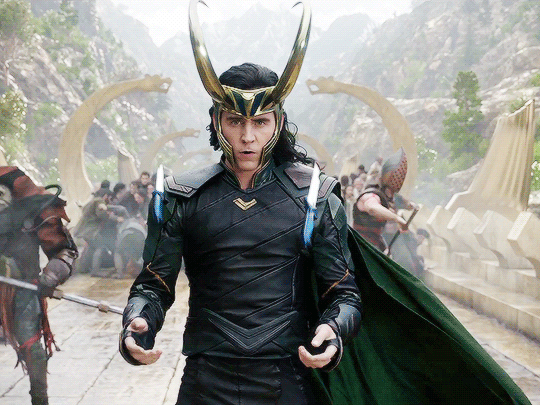
In Thor 3, Loki's silhouette is streamlined even further. The overcoat is done away with in favor of what appears to be a leather doublet, pauldrons, and vambraces. Gold accents are minimal. While stylish, Loki's attire is more practical than showy, and his helm serves the dual purpose of protection as well as weaponry. At this point in his arc, Loki has become a full antihero, joining his brother's side in rescuing as many Asgardians as possible, and eventually dying in a vain bid to protect Thor from Thanos.

The TVA does something very fun and interesting in taking away Loki's ability to dress himself. Since Loki cannot use his magic in the TVA, he is forced to wear the same clothing as his captor/advocate, who eventually becomes his best friend and peer.

Perhaps, on a subconscious level, this helped Loki to feel included. We know by his pwn admission that Loki fears being alone and desperately craves a sense of belonging. At the same time, he intentionally dresses to put people at a distance, thereby protecting himself from potential rejection at the cost of isolating himself further.
When Mobius gives him that TVA jacket for the first time, Loki seems uncharacteristically pleased. It is not an attractive jacket by any means, yet he neither scoffs at it nor refuses to wear it. Instead, Loki puts it on and is content when Mobius says it looks "smart" on him. He continues to dress like Mobius and, indeed, mimic some of his mannerisms such as placing his hands on his hips. Without clothing meant to push people away, Loki opens up, has more fun, and makes friends.
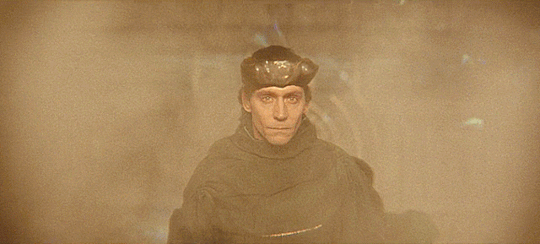
Loki's choice of attire as he assumes the mantle of God of Stories (and time) is fascinating. Setting aside the clear design inspiration from the comics, Loki's silhouette is soft, remarkably so. His colors are earthy hues of green, and the only bit of flare are the light gold trimming and crown. The look brings to mind the garb of sages and wise wizards rather than royalty or warriors. He's powerful yet approachable because there is humility in his bearing. And that humility springs from a well of healthy self-worth, self-love, and a deep love for others.
The shoes are not meant to be attractive. They are meant to help him ascend the throne, nothing more.
8K notes
·
View notes
Text
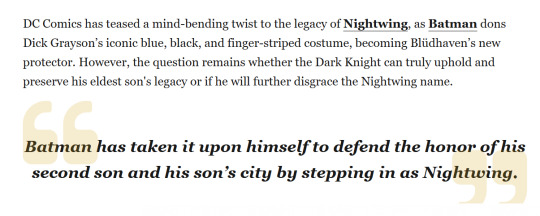
Literally begging Tom Taylor to stop cooking. He's already burnt down the kitchen and the house and the garden outside. It's just one crazy ass plot twist after another. What do u mean the truth of Dick's parents' deaths. What do u mean Bruce is Nightwing. Tom Taylor what the actual fuck are you doing fam. I thought we were done but he truly had to disappoint me one last time. Couldn't let it lie. Fuck.
#DC#DCU#DC Comics#Dick Grayson#Nightwing#Bruce Wayne#Batman#Robin#Robin I#My meta#Anti Tom Taylor#Delete later
31 notes
·
View notes
Text
One thing I haven't seen a lot of talk about in the fandom so far is about the financials of this season.
It took us two whole months to get a confirmation of renewal from Max, and I talked at the time that I think there was probably a lot of heated negotiations going on at the time with contracts and that's why it took as long as it did.
I think we see a huge number of indications of the compromises that were made in order for S2 to be made. One obvious one that has been talked about is being making in in NZ instead of LA, to save $.
But there's also the eight episodes instead of ten. And then the cast aspect. One downside of moving overseas was having to fly out and house the cast, not just pay day wages.
We knew immediately about Guz Khan not coming back, losing Ivan as a character. At the time I was sad but I thought it had the air of a pretty harshly practical call. If you went through the main recurring cast and said okay which character will affect the fewest things, has the least character interactions of anyone? It would be Ivan. (With the only competition being The Swede IMO, but he's Stede's crew and therefore a little more central.)
And then this season started and we got first The Swede sidelined and taken out of major scenes. And then I noticed that different members of the crew were simply absent for long stretches, like Wee John isn't around for ep 5 at all. And then Buttons takes flight.
Lucius and Pete aren't at the party for most of it. Fang isn't in the torture scene. Roach and Fang aren't in the bar. Etc. SCHEDULING IS HAPPENING.
The new characters are almost entirely played by NZ local actors, which is great, but also...cheaper.
In other words there are big signs that they did everything possible to give us a giant cast of almost everyone we love from S1, and cool new characters, in the most economical way possible.
And I'm grateful for it. I'm grateful we got S2, and it looks great, and it's well written, I'm having a blast, and we get to spend more time with this awesome cast.
But I also kinda think it needs to be said that the cost-cutting shows. That it shouldn't have been only 8 episodes, the pacing is off. That we miss every time someone from the ensemble isn't on screen.
That despite what they've put on screen looking very good, there's far less costuming budget, there's less elaborate sets, and it's a little disappointing. And it's clear it's not a lack of will or talent or vision but blatantly lack of money.
Look, streaming networks want brilliant shows that people love (that will get them to subscribe) but they very don't want to pay anyone to make them. That's like, the whole moment we're having right now.
Max puts out promos about how great it is to not have unions messing shit up in NZ. Well I have friends who are union costumers in LA and guess what union costumers did amazing last season. This season, well, I guess Stede got three whole shirts, so that's cool.
So I dunno. It's just stuff I think about. I'm not trying to be negative about the show in any way. I'm extremely happy with this season; I love it more than well, possibly any show I've ever been in fandom for.
But I see you, Max. You're cheap. You weren't that cheap when you were called HBO.
5K notes
·
View notes
Text
On how Crowley and Aziraphale felt during the kiss (but mainly Crowley here):
Ok so first, the main idea for this huge meta is that a LOT of us noticed how the music from the kiss scene is similar to the nebula one, right?
Second, a lot of us also correctly noticed the parallels between the kiss and how it was to taste food for the first time for Aziraphale: bc of his reactions, the hand on lips, the similar way MS acted both scenes, the little inhale etc. So how was it for Crowley?
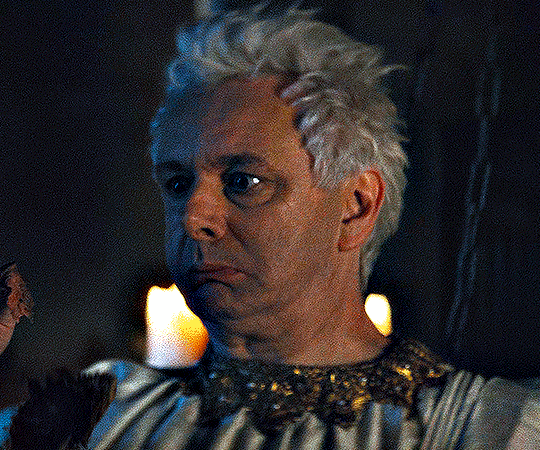
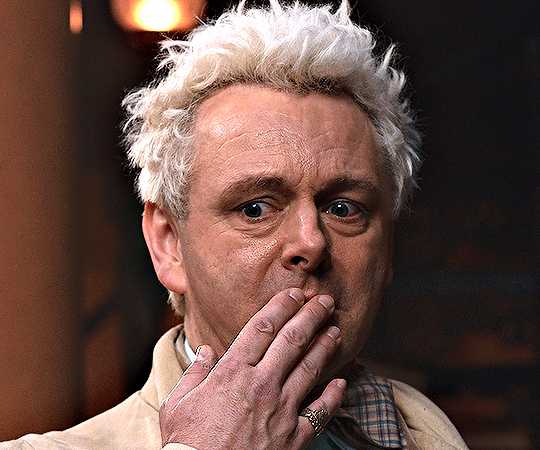
Aziraphale's reaction to the kiss is practically a puzzle to solve on its own, so it's fun to analyse it, but basically, in a few words, Aziraphale kissed Crowley and he discovered he was physically starving for him, longing for him, yearning for him, for his kiss, and he had no idea. Just like with the ox. And now he needs to gorge himself in him but he can't. Great amazing heartbreaking chef's kiss someone give MS an Emmy.
But there's already so much amazing meta out there about Aziraphale x Ox ribs x The Kiss that I want to focus on Crowley here, and on the music.
So back to the music. The song in "Before the Beginning" and the song that plays during The Kiss (I Forgive You + Don't Bother) are so similar. They're not *exactly* the same, but they're totally reminiscent of each other. The viewer is immediately reminded of those chords that played in the opening scene. It's no coincidence that the fandom was talking about this fact only minutes after first watching those final fifteen minutes. This is an obvious intentional choice for storytelling reasons (David Arnold is a genius).
I have no expertise whatsoever when it comes to music, so I asked our friend @otsanda to see if that made sense and not only it does and she explained it, but she also uncovered so much more hidden meaning in all of it (musicians are amazing), so check out her meta about the music that not only serves as evidence to what I'm proposing here but it also has so much more juicy information in it 💖.
Back to the point: WHY thought? Why choose a similar song? Why intentionally COMPOSE a similar song for that moment?
Hear me out. WHAT IF, by reminding the audience of the creation of the nebula, they meant to convey to us that, for Crowley, kissing Aziraphale gave him the same feeling that creating his stars did?
THAT'S what the music is telling us. THAT'S why it makes us remember "Before the Beginning". It may sound cheesy, but Crowley may have literally seen stars when he kissed Aziraphale. He couldn't react accordingly (just like Aziraphale couldn't), bc it was an overwhelming and extremely sad moment (the music is also telling us that) for both of them. They knew it was ending . They were both having a moment of huge revelation that was fated to not come to completion. Crowley was right, it was too late.
It makes sense to show Crowley's feelings through the music, bc he was the one who started the kiss, and also he was wearing sunglasses in that scene, it's different from a character like Aziraphale that has all his million expressions for everyone to see at all times. And they've been doing this ever since s1 with the Queen songs that play in his car or in the background.
So my point is: the same song being used there makes me wonder if kissing Aziraphale finally gave him what he lost. His purpose. What Aziraphale was trying to give back to him by taking him back to heaven. There's no need for Heaven. Just kiss him, Aziraphale, and there he'll find the stars you want to give back to him. There you will one day see that smile on his face you saw Before The Beginning. Neil Gaiman and David Arnold I am in your walls 😭
This is what may lead us to see this happiness in Crowley again (not the action of kissing itself, of course, but what it represents to their relationship, them being together, them being an Us).
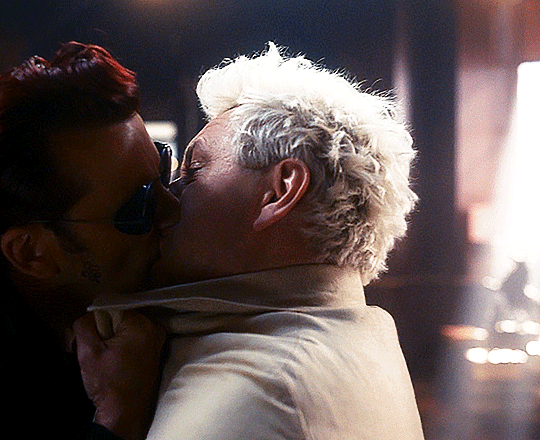
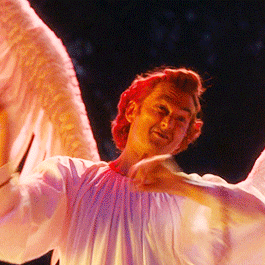
As @otsanda said: from the music we can interpret that that moment was a Revelation for them. Almost a religious experience. Crowley found his purpose again. What he'd been missing the whole season (or even his whole life since the Fall, but we've seen him especially depressed this season).
I'm not even getting into the poetry of how one can interpret the parallel to the angel's reaction to the kiss as carnal, and the demon's as religious; that would be another whole essay but let's just agree that it's incredibly beautiful. (Let me be clear that I mean here Aziraphale's reaction is carnal specifically for Crowley, and Crowley's is religious specifically for Aziraphale, not religious as in "worshipping god")
"Do you ever wonder what's the point?" Crowley asked in s2e1. The point, for him, is Aziraphale (if you've seen The Good Place you know what I mean). I hope he figured this out with that kiss, even as heartbreaking as it was. Even if it was a (temporary) separation kiss. (I hope Aziraphale figures this out with time too, that he's more than enough to make Crowley happy, that Crowley doesn't need Heaven, or stars, that Crowley needs him.)
Maybe that's why Crowley didn't leave and kept waiting outside until the very last moment.
Aziraphale and Crowley both bit the apple at the end of s2. There's no turning back from that Knowledge now.
Edit: I just have to add here this brilliant colour analysis of the nebula scene by @halemerry. And it's pointed out that during the nebula formation there's a moment when it looks like two people embracing. And the fact that a similar song is used in the actual Kiss scene I just... I have no words
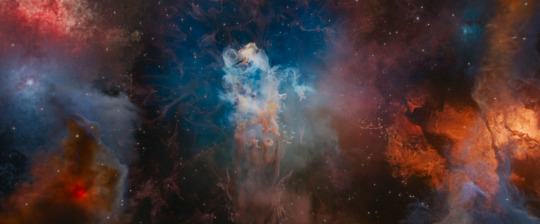
#good omens 2#good omens#ineffable husbands#good omens kiss#my meta#good omens meta#before the beginning#i forgive you#don't bother#crowley#purpose#knowledge#music#david arnold#reactions to the kiss#the angel's carnal reaction vs the demon's religious experience
4K notes
·
View notes
Text

trying to boil them down to their bare essentials for easier writing…. i don’t think i’m doing it right 😭
#homestuck#jane crocker#jade harley#jake english#june egbert#john egbert#hsmeta#op#my meta#<- barely lol
1K notes
·
View notes
Text
"There must be something I can do for you."
OK so I have been trying for the longest time to make sense of why the fuck they KEPT GOING WITH THE MAGIC ACT when they realized they couldn't do miracles. And I think I've got it.
Once again, it boils down to misunderstanding and miscommunication (surprise surprise):
I fully believe Aziraphale thought he was doing Crowley a favor by offering to do his magic act. Crowley’s in trouble with the theater, the alcohol he was going to sell is ruined because of Aziraphale’s shenanigans at the church. To take some of the pressure off Crowley, he offers to perform.
Here's the thing, though. Aziraphale DOESN'T think he's a very good magician. Just look at how nervous he is! He has zero confidence. Even the coin trick he does for Crowley, he's shocked and delighted when it actually works because he doesn't think it's going to. He's pretending for Crowley's sake because he's trying to get Crowley out of the hot seat with the theater.
That's also why he chooses such a dramatic and dangerous trick for the stage: he has to make it good for Crowley.
Meanwhile.
MEANWHILE.
Crowley sees Aziraphale's offer to do the magic act purely as another one of Aziraphale’s whimsies. Which of course he is going to indulge, because he's a lovesick fool. He goes into FULL SUPPORTIVE HUSBAND mode, builds up Aziraphale's confidence, agrees to do the highly dangerous trick because Aziraphale wants to, because he thinks Aziraphale thinks he's good at magic, because he thinks Aziraphale really wants to get up on stage and perform, and he just doesn't want to see Aziraphale embarrassed... (Sound familiar???)
So. We get to the stage. Aziraphale doesn’t actually want to be there, but he's doing it for Crowley; Crowley doesn't actually want to be there, but he's doing it for Aziraphale. BOTH of them are complete idiots, because they're so enamored with each other and so fucking COMMITTED that neither of them wants to back down when they find out they can't do miracles. They just really want to make their husband happy--so badly that they're willing to risk discorporation for it.
In conclusion: they are idiots and I love them but THEY NEED TO COMMUNICATE JESUS CHRIST
It's no wonder the season ended like it did...
#Does this make sense to anyone else??.#Because I was just so confused as to why they kept going with it#Also the miracle blocker like#This is an UNDERUSED item in the feud between Heaven and Hell#SEVERELY UNDERUSED#But that's for a different post I guess#Good omens#Good omens 2#Good omens meta#My meta#Ineffable husbands#aziracrow
2K notes
·
View notes
Text
the anti-Zutara criticism that “Zutara shippers are teenage girls who only like the ship because they self-insert as Katara” is actually so funny because how does that delegitimize the ship? So…girls who relate to Katara like Zuko, and they think Katara would like Zuko, and that’s bad because…girls are wrong? Girls are shallow? Girls don’t know what’s good for them?
Anyway if I were a grown ass man who created a fictional teenage girl that lots of real teenage girls relate to, and these girls believe she would like character B instead of character A, I hope I’d have the humility to say to myself “hmm I wonder why people who relate to this character’s feelings and motivations think she would react this way” instead of jumping straight to “these girls are doomed to like toxic relationships”
(And I know Zutara shippers like the ship for many different reasons, and self-insert is not the most popular by a long shot, I’m just saying that the criticism of self-insert stems from dismissal of what teenage girls like, and that feels kinda misogynistic to me)
#Zutara#pro Zutara#anti bryke#katara#Anti kataang#not really anti kataang but tagging it just in case#I should tag this “pro teenage girls”#My meta
1K notes
·
View notes
Text
kind of obsessed with the decision to start so fully in media res that the bad kids were not only down spell slots and hit points but also deeply emotionally exhausted from a summer full of unrewarded heroism and fully committed to new npcs. like what a good way to fully suck your audience back in and also honor the lapse of time irl and in story time. truly no one does exposition like D20, Brennan is never not smart about perfectly balancing world building, character background and plot hook. and since we know the characters and the world we could start this campaign fully *in* the plot right from the word go. and then instead of an inciting incident leading to a battle, or a break from the character's normal reality causing them to fight for the first time (ie the first season), the end of this battle is the inciting incident for the rest of the season. being in combat and saving the world *is* the normal reality for the bad kids. and this sets up FHJY as a campaign that can be focused on something other than that, because the story starts at the end of that normality, or when something in that normality shifts. (is the inciting incident Fig's new powers? or how this battle resolves? TBD! but I have a good feeling about it regardless). SO smart. because if we went from sophomore year straight to a campaign that was focused more around school and the normal experience of being a teen? it would feel weird. but this is the perfect set up.
1K notes
·
View notes